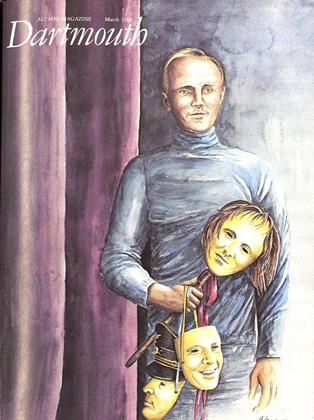Harrison Salisbury, the long-time Moscow correspondent for the New York Times, on campus this winter as the Kenneth and Harle Montgomery Visiting Fellow, presented a series of four timely lectures on Russia, China, U.S. policy in Iran and Afghanistan, and the role of the press. Salisbury won the Pulitzer Prize in 1955 for his reporting about the Soviet Union. Having visited every communist country except Cuba, he brought his Dartmouth audience an insider's story. The "elegant journalist," as he was described, addressed capacity crowds. He talked about diplomacy and intrigue, told anecdotes, and moralized.
Salisbury the Soviet expert criticized the political maneuver of "playing the China card," better held in our hand as a threat to Russia. Before formulating foreign policy, he said, we should study geography and history. Lesson number one should be to find out "where a country is and how it got there." Salisbury also contended that U.S. withdrawal from the summer Olympics, while effectively "spoiling the party," denies Russian citizens a glimpse of Western culture and democracy, which in the long run might do us more good.
Salisbury the author also spoke to history, government, and Asian studies classes, and met with individual students. He said later he was sorry more students didn't come forward to challenge his views and suggested that increased foreign student enrollment at Dartmouth might contribute to debate on foreign affairs.
Without much snow in Hanover this winter, student attendance at lectures was high. Salisbury sat on a panel with Alger Hiss, the former State Department official, one-time president of the Carnegie Endowment for International Peace, and lawyer, speaking on "The United Nations From Original Concept to Present-day Resolutions." Although Hiss spoke on the history of the UN, members of the audience seemed more interested in his past. Hiss has consistently denied charges set forth by Whittaker Chambers in 1948 that he transmitted confidential government documents to the Communist Party.
The UN was a recurrent lecture theme. Andrew Young, the former ambassador and persuasive preacher, spoke to a Thompson Arena audience about U.S. foreign policy, emphasizing the importance of the world body. He was here as a Class of 1930 Fellow, through a fund set up to bring distinguished people to the Dartmouth campus. Young seemed to enjoy his brief stay, during which he met with student organizations and was humbled on the indoor tennis courts by the 95-pound captain of the women's team, Pam Banholzer '81.
 View Full Issue
View Full Issue
More From This Issue
-
 Feature
FeatureThe Trapper, the Beaver, and the Cold Country
March 1980 By Dan Nelson -
 Cover Story
Cover StoryMICHAEL MORIARTY ’63, ACTOR
March 1980 By Keith Bellows -
 Feature
FeatureManaging Dartmouth’s Money Slide Turns to Rally
March 1980 By Dero A. Saunders -
 Article
ArticleTracker of the Right Stuff
March 1980 By M.B.R. -
 Class Notes
Class Notes1913
March 1980 By CARL C. FORSAITH -
 Class Notes
Class Notes1978
March 1980 By JEFF IMMELT







